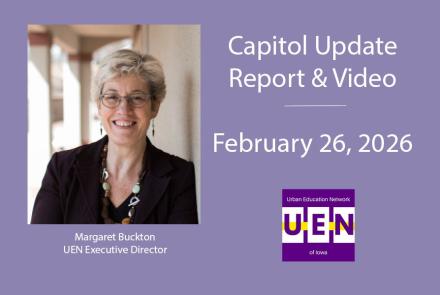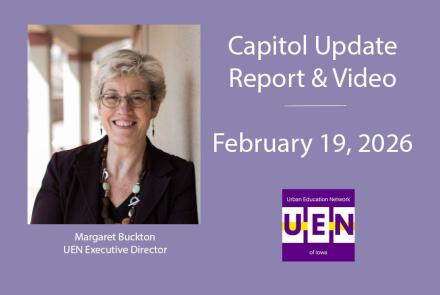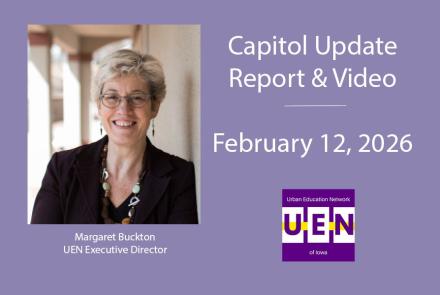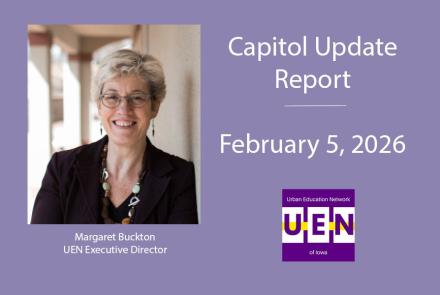UEN Comments Regarding ARC 5580C Therapeutic Classrooms and Telehealth
UEN Comments re Proposed Rules ARC 5580C
Therapeutic Classrooms and Telehealth
May 11, 2021
Download the full Comments re Proposed Rules ARC 5580C Therapeutic Classrooms and Telehealth
Thank you for the opportunity to provide comment regarding proposed rules to implement Therapeutic Classrooms and Telehealth. The Urban Education Network is generally supportive of the proposed rules, but has the following suggestions to further clarify and some additional questions.
Division I: No comment
Division II: Definitions: We have a slight concern with the definition of therapeutic classroom for different classroom configurations that are not supported by the initial grant application and pilot project. Therapeutic classrooms are not mandated and in most cases, without the pilot project funding support, not affordable. It is critical to ensure these rules are not placing additional service requirements and burdens on school districts that are not engaged in the pilot project, but may be moving students with behavior disorders to a different setting that is not the general education classroom.
Classroom clear provisions and required parent/guardian notifications and responses are very close to the statute, so no additional comments.
14.10(3) Documentation and Reporting: the first sentence repeats the district’s reporting requirements from subsection 1. It would better fit in the first subsection that districts must maintain documentation of all reports. The second sentence defines students, which might better fit in the definitions section. That leaves the third sentence about the DE’s compilation report which suggests a title of subsection 3 be Department Annual Compilation Report.
14.11 Crisis Response: No comments
14.12 Prevention of Classroom Behaviors: The list of evidence-based tiered supports that the DE includes in their framework looks good.
14.13(2) Therapeutic Classroom Requirements: We suggest changing “same age/grade peers” to relatively similar age/grade peers. With very small class sizes in therapeutic classrooms, there may not be another student of the same age or grade in the mix.
14.13(3)(c) Review every 60 days: We would prefer it say the review shall be regular and allow some local control on that provision. It might better fit in the definition of therapeutic classroom, students should be assigned to therapeutic classrooms temporarily, not indefinitely, with regular review of progress toward the BIP goals…
14.13(5): The prohibition of districts’ ability to hold or reserve seats may prevent more therapeutic classrooms from ever existing. SF 2360 did not prevent this funding method, which may be most necessary to get the ball rolling. We prefer no limitations, but if there must be, we would suggest the practice of committing to or reserving seats be allowed for the initial 2-3 years of a therapeutic classroom, with the intent to transition to stable funding as staff are hired and seats become full. Schools can't serve this very needy population without appropriate staff and we can't hire staff without knowing if revenue will be forthcoming.
14.14(2) Claims for Reimbursement: Subsection g: Does there also need to be confirmation that a student does not have an IEP? That would help the DE and other participating districts in open enrollment relationships understand whether Medicaid claiming or other special education services billings should or even can be undertaken.
15.15(3): Although we know the provision of training is necessary and must be reviewed, we would prefer the word “regularly” or at least once during every licensure review cycle rather than the provision of annual review, unless it is required for an individual’s personal professional development plan, based on an individual teacher’s needs.
14.15(4): Within one year of accepting beginning employment in a teaching position in Iowa, a classroom teacher shall receive training . . . . many new teachers accept teaching jobs in the Spring, well ahead of the beginning of the fiscal year. We should pay them for training that is necessary, but should not count the time before they are contracted and employed by the district as a window for training to happen.
14.15(5) Subsection h: Requires documentation and notification requirements for incidents of seclusion, restraint, classroom clear and transfer or referral to a therapeutic classroom. Since not all districts will have them, add the phrase after classroom, if the district has a therapeutic classroom. (although the training on all of the provisions up to the therapeutic classroom is fine).
Division III School Behavioral Health Screening and Telehealth:
14.21 Definitions: Behavioral Health Screening definition raised questions for our UEN Health Services Directors. Their use of the SABERS for academic and social-emotional health is not the screener many of them would use if they believed a student had an elevated need for mental health services, but it is still a screener that might fit this definition, triggering some of the later requirements. They were also concerned about the requirement that the use of the universal screener would trigger the requirement for a mental health professional to be available during the screening, which is mentioned in 14.22(1). We just want to confirm our understanding that the mental health professional is required if districts contract for screening services, but screeners could be administered by appropriately trained school personnel without requiring the mental health professional to be present during administration. They said it might be more appropriate to have the mental health professional required to assist with interpretation of the screener data, in making recommendations for referral to a mental health professional.
14.23(2)(c)(2): The student’s parent or guardian is present – can that presence be virtual, too?
14.24(2) School Responsibilities: Subsection e: States: Provide information to the student participating in telehealth services about how and to whom to report inappropriate behavior by a mental health professional. We don’t believe this is the schools' responsibility to work directly with the student on a regular basis regarding this provision. We would suggest that the parent consent could include a statement that the parent is responsible for reporting inappropriate behavior of a mental health professional to the appropriate source and would hope this practice would meet the intent of the law. Of course, if the school observed something inappropriate, they would need to report given their mandatory reporter status, which is already in current law.
Thank you again for the opportunity to provide input.
UEN Contact:
UEN Executive Director, Margaret Buckton, margaret@iowaschoolfinance.com (515) 201-3755
UEN Chair, Dr. Vickie Murillo, Council Bluffs, vmurillo@cbcsd.org







